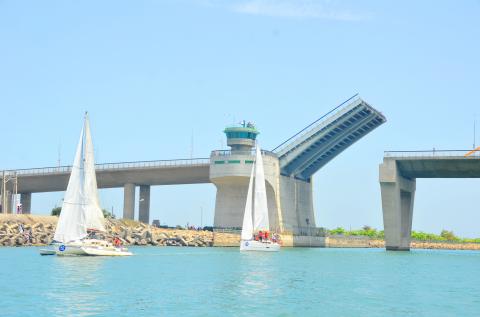Chinese practice
船到橋頭自然直
The boat will sail straight when it reaches the bridge.

Photo: Yeh Yung-chien, Liberty Times
照片:自由時報記者葉永騫攝
成語「船到橋頭自然直」,字面上的意義是「當船航行到了橋頭,它自然就會打直了」,這句話是用來安慰說,在不利情況下的關鍵時刻,總有解決方式會自己出現。船到橋頭自然直有時也作「船到橋門自會直」。
「船到橋頭自然直」這個成語,是出於中國導演洪深在一九三○年至一九三二年間所作《農村三部曲》劇作的其中一部,名為《香稻米》。
在《香稻米》第二幕中,劇中角色黃二官說:「不要這樣想,『船到橋門自然直』,我們慢慢的總有法子好想。」
「船到橋頭自然直」也常見於此對句:「車到山前必有路,船到橋頭自然直」。這句話字面的意義是:「當車開到了山前,我們就會找到通過的路;當船航行到了橋頭,船身自然就會打直航行。」
在英文中類似的成語及說法為:「Let’s (we’ll) cross that bridge when we come to it」(讓我們遇到橋後再過橋)以及「Let’s worry about it when it happens」(等到事情發生我們再來擔心吧)。此二句的意思都是現在不需擔心,只要等問題發生後(如果真的會發生)再處理它就行了。
英文中兩個更進一步的說法是「Everything will be all right in the end」(一切最後都會沒問題的)以及「It will be all right on the night」(到了〔表演〕當晚準會令人滿意),這兩句都和上段兩句類似,但是這兩句都更強調不利的情況,也更有到最後一切都會順利完成的勸慰之意。
(台北時報編譯林俐凱譯)
英文練習
Let’s cross that bridge when we come to it.
The Chinese proverb 船到橋頭自然直 literally means “The boat will sail straight when it reaches the bridge” and is used to reassure that a way out always presents itself at the critical juncture of an unfavorable situation. 船到橋頭自然直 is also sometimes written as 船到橋門自會直.
The proverb 船到橋頭自然直 appeared in Fragrant Rice, one of three plays collectively known as Trilogy of the Countryside, written by Chinese writer and film director Hong Shen between 1930 and 1932.
In Act 2 of the play, Huang, the offspring of a senior official, says the line: “Don’t think such thoughts, ‘the boat will sail straight when it reaches the bridge;’ we’ll eventually hit upon a solution.”
船到橋頭自然直 also appears after the common saying 車到山前必有路 to form the couplet: 車到山前必有路,船到橋頭自然直. The phrase literally means: “When the cart reaches the mountain, we’ll find a way through; when the boat reaches the bridge it will sail straight.”
Similar proverbs and sayings to 船到橋頭自然直 in English are: “Let’s (we’ll) cross that bridge when we come to it” and “Let’s worry about it when it happens,” which both mean that there is no need to worry now; one should deal with the problem when — and if — it arises.
Two further sayings in English, “Everything will be all right in the end” and “It will be all right on the night,” are similar to the above two, but in both there is a stronger certainty that the unfavorable situation will take place and a stronger connotation of reassurance that all will turn out well in the end.
(Edward Jones, Taipei Times)

A: China’s animated blockbuster “Ne Zha 2” also smashed a box office record recently. B: It’s No. 7 among the world’s best-selling films, grossing more than US$2 billion globally. A: I t has even become the world’s highest-grossing animated film, while the political metaphors in it are causing controversy. B: But who is Ne Zha anyway? A: Ne Zha, often spelled as “Nezha,” is actually a mythical teenage deity with superpowers. A: 中國動畫片《哪吒2》最近也打破紀錄。 B: 該片已衝上影史票房排行榜第7名,全球狂賣超過20億美元。 A: 聽說它甚至是全球最賣座的動畫片,影片中的政治隱喻卻引爆爭議! B: 但哪吒是誰? A: 哪吒的名字常被拼成「Nezha」,是神話中具有超能力的青少年神明。

You enter an old-fashioned detective’s office. The door locks with a click as a radio buzzes: “Rookie detectives, a priceless diamond is missing! Solve the case in one hour.” The room is filled with clues — photographs, coded messages and secret compartments. As the grandfather clock ticks, you and your friends must work to unlock the secrets. This is what escape rooms are all about — immersive adventure games where you solve puzzles and escape the themed setting within a time limit. The concept of “escape rooms” dates back to early first-person video games. In 1988, John Wilson introduced

People desire a sense of purpose in their lives, but they often remain idle unless they have a clear reason to act. This concept is illustrated by the retirement paradox. People work hard to prepare for a future without work but find life meaningless after achieving that goal. A study was carried out to determine if a reason, even a minor one, could encourage idle people to take action. __1__ Upon finishing the first, they were instructed to drop it off at a location either right outside the room or at a spot farther away, which would take around

A: Were there any highlights at the Oscars this year? B: With 13 nods, French director Jacques Audiard’s “Emilia Perez” broke the record for most Oscar nominations earned by a non-English film. A: Wow, it broke the record of 10 Oscar nominations set by Taiwanese director Ang Lee’s “Crouching Tiger, Hidden Dragon.” B: On the eve of the Oscars, Lee was honored with the Lifetime Achievement Award at the Directors Guild of America (DGA) Awards. A: It seems that Hollywood has finally become more diverse. A: 今年的奧斯卡獎有什麼亮點嗎? B: 法國導演賈克歐迪亞的《璀璨女人夢》榮獲13項提名,打破了非英語片紀錄! A: 哇打破了台灣導演李安的《臥虎藏龍》10項提名紀錄。 B: 李安則在奧斯卡前夕,獲頒美國導演工會「終身成就獎」。 A: 看來好萊塢終於比較多元化啦。 (By Eddy Chang, Taipei Times/台北時報張迪)